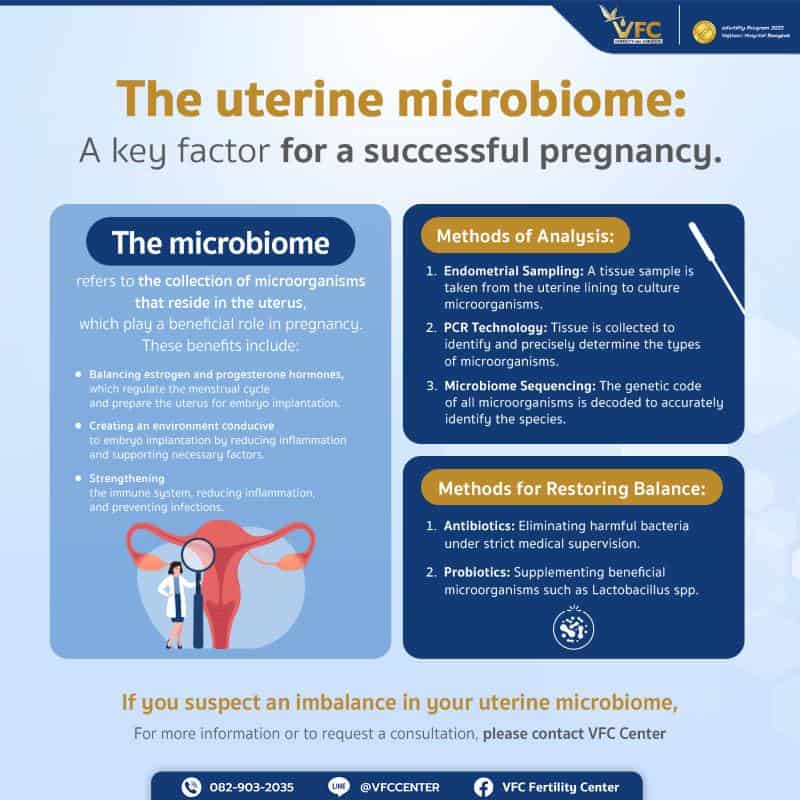
To achieve a successful pregnancy, various factors must come together, one of which is testing the uterine microbiome to determine if it is balanced. If any abnormalities are present, this may contribute to infertility. Therefore, to help ensure that the couple’s pregnancy plan proceeds as desired, it is important to understand the uterine microbiome, including its functions and benefits, so that it can be maintained in balance, which will ultimately improve the chances of conception.

What is the Uterine Microbiome?
The uterine microbiome refers to the collection of microorganisms living in the uterus, including bacteria, viruses, and fungi, some of which are beneficial, while others may be harmful to the body.
Under normal conditions, the uterine microbiome performs several vital functions, including protecting against harmful microbial infections, maintaining the balance of acid and alkaline levels in the tissue, supporting the immune system’s function, and regulating reproductive system processes.
How Does the Uterine Microbiome Benefit Fertility?
The uterine microbiome offers several benefits for fertility, as outlined below:
Maintaining Hormonal Balance
One of the key roles of the microbiome is to help maintain the balance of estrogen and progesterone hormones. These hormones regulate the menstrual cycle and prepare the uterus for embryo implantation. Beneficial microorganisms create an environment that enables these hormones to function effectively.
Supporting Embryo Implantation
The uterine microbiome plays a significant role in supporting embryo implantation. When the embryo moves into the uterus, a balanced microbiome helps create an environment conducive to implantation by reducing inflammation and promoting necessary growth factors
Impact on the Immune System
The uterine microbiome interacts closely with the body’s immune system, helping regulate immune responses within the uterus. A healthy microbiome reduces inflammation and prevents infections, which is essential for a healthy pregnancy.
However, if the microbiome is imbalanced, it can trigger chronic inflammation in the uterus, which negatively affects embryo implantation and can lead to infertility.

Microbiome Analysis in the Uterine Lining: What Are the Methods?
Analysis of the uterine microbiome has been developed to assist in diagnosing infertility that may occur due to an imbalance of these microorganisms, and this assists in planning fertility treatment. The commonly used methods are as follows:
Endometrial Sampling
This test involves using a special instrument that is inserted into the uterus to collect a small tissue sample. The sample is then cultured to grow microorganisms and detect any potential abnormalities. This test provides highly accurate information. The procedure is quick and safe, although there may be slight discomfort during the process.
After the sample is collected and cultured, it will undergo a process to identify the types of microorganisms, which can be done using two methods:
- The use of PCR (Polymerase Chain Reaction) technology is a modern method for detecting and identifying microorganisms in tissue samples. This technique can detect microorganisms even in very small quantities and accurately identify their species.
- Microbiome sequencing is a method that involves decoding the genetic material of all the microorganisms found in the sample. This provides a comprehensive overview of the uterine microbiome, offering the most detailed information about the types and diversity of microorganisms, as well as the relationships between different species.
Methods for Restoring the Balance of the Uterine Microbiome
When an imbalance in the uterine microbiome is detected and identified as a potential cause of infertility, doctors will tailor a treatment plan based on each patient’s condition. The main methods of treatment include:
Use of Antibiotics
After diagnosis, if harmful bacterial infections or an overgrowth of bad bacteria are detected, doctors will consider using antibiotics to eliminate these pathogens. The use of antibiotics should be strictly monitored by a healthcare professional, as antibiotics may also impact beneficial microorganisms.
Probiotic Supplementation
Another increasingly popular method is supplementing beneficial microorganisms, including Lactobacillus Spp, Lactobacillus Crispatus, Lactobacillus Gasseri, Lactobacillus Iners, and Lactobacillus Jensenii. These probiotics can be taken orally or applied topically, depending on the doctor’s recommendation.
Understanding the role and function of the microbiome can help you recognize the factors affecting pregnancy and enable you to plan for parenthood more effectively. If you suspect an imbalance in your uterine microbiome or are experiencing infertility, you can undergo diagnostic tests or explore other potential causes of infertility at VFC Center, the Fertility Technology Center. We are committed to providing attentive care and support throughout the process. For an infertility check in Bangkok, contact us today.
Article by Dr. WORAWAT SIRIPOON
Contact or Book a Consultation:
VFC Center – V-Fertility Center
Hotline: 082-903-2035
LINE Official: @vfccenter

OBSTETRICS AND GYNAECOLOGY-REPRODUCTIVE MEDICINE





No Comments
Sorry, the comment form is closed at this time.